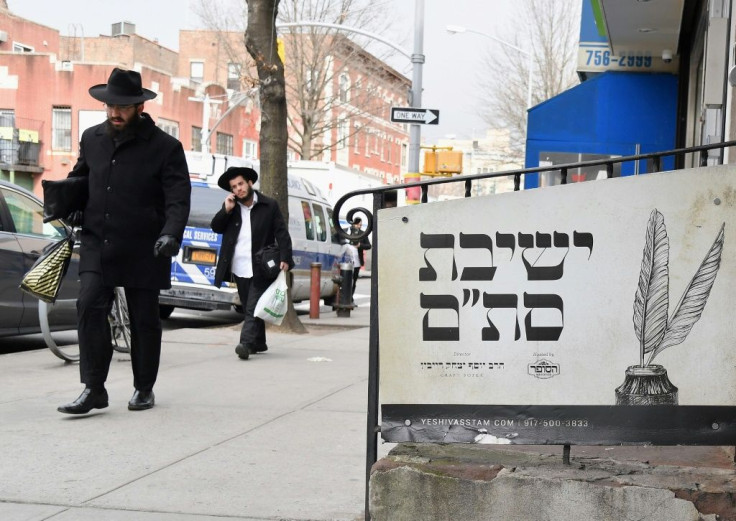Reporters Assaulted, Lack Of Police In New York City Anti-Lockdown Protest Offer Contrasting Image To BLM Protests
KEY POINTS
- At least three people covering the two nights of anti-lockdown protests by New York City's Orthodox Jewish community were assaulted by protesters
- Witnesses said the police presence was considerably lighter compared to the summer's BLM protests
- No arrests were made, despite the assaults being recorded by either witnesses or the victims
A journalist is recovering Thursday after being assaulted during protests by New York City’s Orthodox Jewish community against Gov. Andrew Cuomo’s latest coronavirus restrictions. He was one of multiple people assaulted during two nights of protests which, in some respects, served as a stark contrast to the summer’s Black Lives Matter protests.
As of Thursday, New York had over 473,000 confirmed cases and 32,850 reported deaths from coronavirus.
The reporter was identified as Jacob Kornbluh, who was covering Wednesday’s protests in Brooklyn for Jewish Insider. Videos from the protest showed Kornbluh surrounded by a large group of protesters who pinned him against a building while calling him a moyser, Yiddish for snitch. Witnesses said one of the protest’s organizers, identified as Heshy Tischler, egged the crowd on against Kornbluh while also using racist language to attack New York City Mayor Bill de Blasio's family and other city officials.
The two-nights of protests were in response to Cuomo’s newest coronavirus lockdown amid rising cases, especially among the Orthodox Jewish community. Cuomo addressed this during his Sept. 29 press briefing, saying he planned to meet with community leaders in an effort to address the pandemic. However, some within the Orthodox Jewish community said they were skeptical given the apparent lack of mind paid to coronavirus.
Here’s Heschy egging then on. “He’s lucky time be alive,” one of the protesters told me after.
— Jake Offenhartz (@jangelooff) October 8, 2020
A few yards away, cops agree to close more streets, joking around with same men who just beat up a reporter pic.twitter.com/UekTnKQqrA
Kornbluh said in a Twitter post he was assaulted multiple times by the crowd before police and other community leaders stepped in to get him out. Kornbluh thanked everyone who stepped in to save him, while some of the protesters were heard saying he was “lucky to be alive.”
I was saved by heroic police officers and several community members. I’m safe right now.
— Jacob Kornbluh (@jacobkornbluh) October 8, 2020
Kornbluh was the third person assaulted by the crowds in Brooklyn after protests started on Tuesday. Photographer Bruce Schaff and another man, identified as Berish Getz, were assaulted during the first night of protests.
Schaff, for example, told New York NBC-affiliate WNBC he was swarmed by protesters abruptly. He stayed for several minutes before leaving, but said he was followed by multiple protesters demanding he turn off his camera.
“As soon as I turned off my camera, they'd start beating me,” Schaff said.
Cuomo reinstituted limits on social gatherings and ordered schools and houses of worship closed in hot spots in an attempt to contain the virus.
The scene in Brooklyn over the two days of protest contrasted BLM protests in certain notable ways, arguably the biggest being the police presence. Schaff said he was surprised by the general lack of officers deployed to the protests while protesters appeared to harass witnesses and set fire to piles of masks in the streets.
“I’ve been at BLM protests where there are 60 people and 200 cops,” Schaff said. “Last night there were two police officers.”
Witnesses said more officers were present, but reaffirmed Schaff’s comment that the police presence was considerably lighter compared to the BLM protests. No arrests were made or summons issued, despite all three assaults being recorded by either the victims or other witnesses.

© Copyright IBTimes 2025. All rights reserved.





















